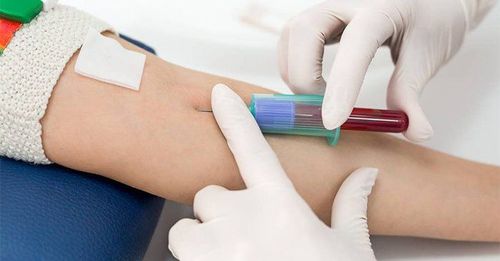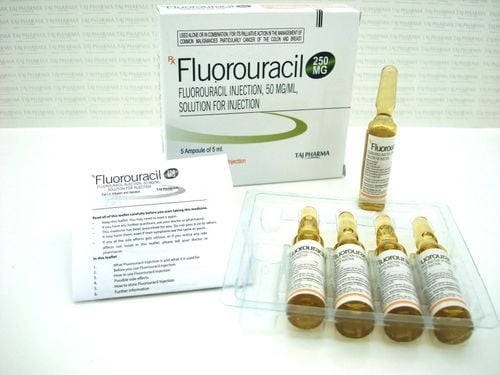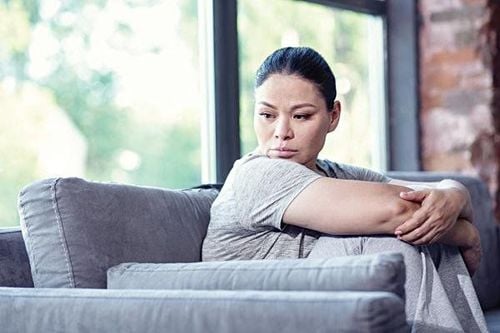This is an automatically translated article.
The article was professionally consulted by Dr. Nong Ngoc Son - Chemotherapy and palliative treatment - Oncology Center - Vinmec Central Park International General Hospital.A woman's risk of breast and ovarian cancer is higher if she has BRCA1 or BRCA2 gene changes, and men with these gene changes are more likely to develop breast cancer.
1. What is the BRCA gene test?
Breast cancer gene testing (BRCA) is a blood test to check for changes (mutations) in genes called BRCA1 and BRCA2. This test can help determine your risk for breast and ovarian cancer. A BRCA gene test is not used to definitively diagnose cancer.A woman's risk of breast and ovarian cancer is higher if there is a change in the BRCA1 or BRCA2 gene. Men with these gene changes have a higher risk of developing breast cancer. People with this mutation are also more likely to get other cancers. BRCA gene mutations can be inherited from either the mother's or father's side of the family.
This test is only done for people who have a close relative with breast or ovarian cancer or who have had one of these cancers. If a healthy person does not have the cancer mentioned above, the possibility of changing the BRCA gene is very rare. Only about 2 or 3 out of every 1,000 adult women have a BRCA gene change. That means 997 or 998 out of 1,000 women do not have this change.
2. When is BRCA gene testing done?

Xét nghiệm gen BRCA được thực hiện khi nào?
The patient is diagnosed with breast cancer before age 50. The patient had cancer in both breasts. Had breast cancer and ovarian cancer. Having one or more male family members with breast cancer. There are many cases of breast cancer in families. Have at least one family member with BRCA-related cancer.
3. Some notes about BRCA . gene testing
There are several important things to keep in mind when considering BRCA gene testing.A negative BRCA result does not guarantee breast cancer-free. BRCA gene changes increase breast cancer risk. But there are other gene changes that can also cause cancer.
If a family member has breast or ovarian cancer, think about asking that person for a BRCA test before deciding to get tested for yourself. If a family member's results are negative, there is rarely a need for further BRCA testing for the rest of the family.
Experts do not recommend BRCA testing for women who do not have BRCA-modifying familial risk factors. Because then, the BRCA test may not provide additional helpful information about breast cancer risk. Women from intermediate-risk families rarely test positive.
It is very important to have genetic counseling both before and after this test. It can help understand the benefits, risks, and possible outcomes of the test.
It may take several weeks for test results. Therefore, it is necessary to see a doctor or genetic counselor again to have an appropriate monitoring or treatment plan.
4. Clinical significance of test results

Xét nghiệm gen ung thư vú (BRCA) là xét nghiệm máu để kiểm tra sự thay đổi (đột biến) trong các gen
4.1 Normal No changes were found in the BRCA1 or BRCA2 genes. Normal outcomes and shared family risks must be considered together. If there is a strong family history of breast or ovarian cancer, the cancer risk may be higher than normal even with a negative BRCA result. Only about 5% to 10% of breast and ovarian cancers are associated with BRCA1 or BRCA2 gene changes. There may still be other gene changes that increase the risk of cancer. 4.2 Abnormal BRCA1 or BRCA2 gene changes are present. Women with a BRCA1 or BRCA2 gene change have: Women with a mutated BRCA1 or BRCA2 gene have a 40% to 85% chance of developing breast cancer in their lifetime. Women with a mutated BRCA1 gene have a 25% to 65% lifetime risk of developing ovarian cancer. Women with a mutated BRCA2 gene have a 15% to 20% lifetime risk of developing ovarian cancer. The range of risks will depend on the type of gene and personal and family history of cancer. Men with the BRCA2 mutation, and to a lesser extent the BRCA1 mutation, also have a higher risk of breast cancer. Men with mutations in the BRCA1 or BRCA2 genes have a higher risk of prostate cancer. Currently, Vinmec International General Hospital deploys a package of screening and early detection of breast cancer and gynecological cancer by combining 4 technologies: genetic testing, endoscopy, ultrasound and immunoassay. In particular, cancer screening with genetic technology is a method that is considered a breakthrough in medicine.
Vinmec is one of the hospitals that not only ensures professional quality with a team of leading doctors and nurses, a system of modern equipment and technology, but also stands out for its comprehensive medical examination, consultation and treatment services. , professionally; civilized, polite, safe and sterile medical examination and treatment space. Customers when choosing to perform tests here can be completely assured of the accuracy of test results.
Doctor Nong Ngoc Son has many years of experience directly treating cancer patients, especially in the field of chemotherapy, metastatic late-stage cancers, and end-of-life patients.
Customers can directly go to Vinmec Health system nationwide to visit or contact the hotline here for support.
MORE:
Inherited BRCA gene mutations & Risk of breast and ovarian cancer Testing for genetic mutations in BRCA genes - How to reduce cancer risk? Mutations in the BRCA1 and BRCA2 genes - the leading risk of breast cancer














